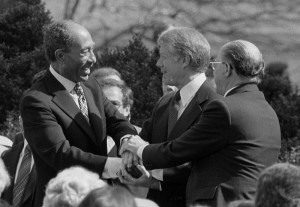So You Think You Can Bring Peace to the Middle East?
 I’ve never used a computer game in my teaching, but Andrea Schneider and Kathleen Goodrich ‘o8 make a good case that the game PeaceMaker has a lot to teach dispute resolution students. The game puts players into the position of either the Israeli Prime Minister or the Palestinian President, with an opportunity to achieve peace and win a Nobel Prize or fail and lose office. Andrea and Kathleen describe how the game can be used to teach principles of dispute resolution in a new paper entitled “The Classroom Can Be All Fun & Games.” Their paper, which is available on SSRN here, was recently published at 25 Ohio St. J. on Disp. Resol. 87. The abstract appears after the jump. Do readers have any other suggestions for computer games that can be usefully incorporated into law-school teaching?
I’ve never used a computer game in my teaching, but Andrea Schneider and Kathleen Goodrich ‘o8 make a good case that the game PeaceMaker has a lot to teach dispute resolution students. The game puts players into the position of either the Israeli Prime Minister or the Palestinian President, with an opportunity to achieve peace and win a Nobel Prize or fail and lose office. Andrea and Kathleen describe how the game can be used to teach principles of dispute resolution in a new paper entitled “The Classroom Can Be All Fun & Games.” Their paper, which is available on SSRN here, was recently published at 25 Ohio St. J. on Disp. Resol. 87. The abstract appears after the jump. Do readers have any other suggestions for computer games that can be usefully incorporated into law-school teaching?

